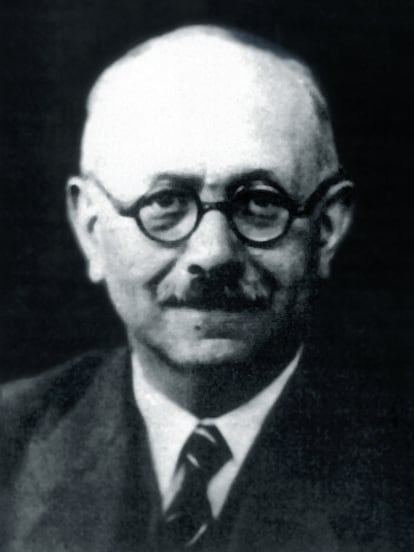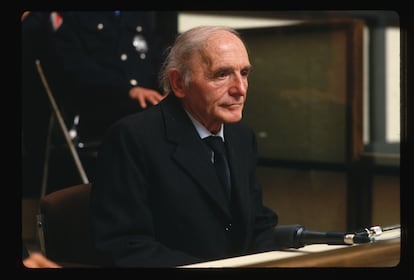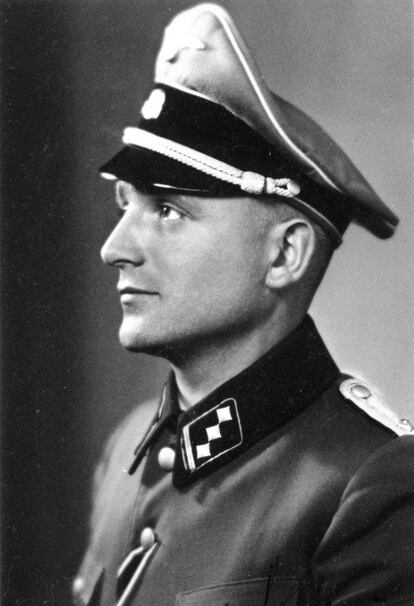Marc Bloch, the researcher who changed history and was tortured by Klaus Barbie
The historian and member of the Resistance, who was executed by the Nazis in 1944, will become one of the illustrious figures inducted into France’s Pantheón

French historian Marc Bloch (1886-1944) will be inducted into France’s Pantheón of illustrious figures, according to an announcement made by the country’s President Emmanuel Macron on November 23. Eighty years have passed since Chauvrais, one of Bloch’s monikers during the German occupation, was arrested, interrogated by Gestapo chief Klaus Barbie and finally, executed in a group of 30 people. He had just finished the draft of two fundamental works for understanding our times: Strange Defeat, outlining the collapse of France in the face of Nazism, and The Historian’s Craft, a defense of his work against obscurantism and hatred, words that the medievalist left behind, written in blood.
His was a life defined by his work and the history of Europe. He was born in Alsace to a Jewish family, though he would soon move to Paris, where his father taught ancient history. Bloch followed the well-worn path of the French intellectual and political elite and attended the Ecole Normale Supérieure, and then opted to teach, his great passion. He worked at the lycées of Montpellier and Amiens, until the outbreak of the Great War. A decorated Captain Bloch returned to his native region, where he was hired at the University of Strasbourg, which had been reincorporated into France. There, he came into contact with a group of social scientists, many of them German, who wanted to leave behind their previous disciplines in the post-war period. For years, they fostered an exchange of methods and ideas pertaining to economics, geography, sociology and psychology. It was during this time he met the man who would become his great friend, Lucien Febvre, with whom he founded the journal Annales in 1929. Bearing the tagline “Economic and Social History,” it completely renewed its field of study.
A decade later, he published his masterpiece Feudal Society and became chair of economic history at the Sorbonne. He hardly had time to enjoy the position. In September, war broke out again. Captain Bloch, despite being over 50 years old and having six children, volunteered. On the frontlines, he witnessed a long retreat from Belgium to Dunkirk, which left both the army and country paralyzed. He described with great lucidity the causes of an unmitigated defeat that no one wanted to recognize. The French military strategy, based on the aged defensive tactic of the trenches, was a great mistake.
Bloch once wrote that the Germans’ triumph was an intellectual victory. He saw similarities in the attitude of the political and diplomatic elite, as well as a good part of French society. Pétain, Verdun’s hero, asked for an armistice with Germany amid France’s internal war. Collaborationism and racial laws sprang up around the country. Following the enactment of anti-Jewish laws by the Vichy French government, in October 1940, Bloch was expelled from the Sorbonne. With much difficulty, he managed to move his family to the heart of a France that had been split into two.

In Clermont-Ferrand, he made contact with early local resistance groups, but it was in Montpellier that he came to form part of Combat, one of the country’s most extensive underground networks. Albert Camus, editor-in-chief of its publication, agreed with Bloch on opposing the occupation by all mean necessary and on denouncing collaborationists. Both were driven by the need to write, to be clear, to the end.
Bloch moved to Lyon in the middle of 1943 to organize the local insurrection. He went by the alias Narbonne, the ancient capital of Gaul. Himmler himself, one of the Nazi leaders, gave the order to put an end to the conflicts and to hasten the “final solution” in France. The SS destroyed the ancient port city of Marseille, closed the Spanish border and laid siege to Lyon, Nice, and Nîmes. On March 8, 1944, Bloch was arrested by the Gestapo. Transferred to prison, he began to be tortured by Klaus Barbie, known as the Butcher of Lyon.

Bloch, who just two decades before had written Les Rois thaumaturges, knew that men like Barbie had blind faith in power, that they exercise it on their victims through blows and humiliations. The old supernatural belief in the royal dynasties of France and England survived in the 20th century through the cult of the leader. A new feudalism was sweeping Europe. Bloch faced off with it, with all of his militaristic knowledge, with every tool at the disposal of a historian.
He wrote his final work while underground, though it remained unfinished. It is not a denouncement nor an accusation of collaborationists. He knew that sooner or later, he would be caught. It was The Historian’s Craft, a defense of both archival work and critical capacity, the two great weapons of “the science of change,” as he called history itself.

Barbie, who had killed Jean Moulin, the leader of the French resistance, a few months prior, had free reign. He started with frigid showers at dawn and solitary confinement, proceeded onto dislocated wrists and various broken ribs. But Bloch would reveal only his real name. Finally, on June 16, with the Allies in Normandy, he was driven outside of Lyon, where he was executed, along with other members of the local resistance.
Bloch is being inducted into the Pantheón “for his work, his teaching and his courage,” according to Macron. His books of explanatory synthesis are still used today as manuals. His didactic idea of history as a tool of citizenship is now seen as a threat to narratives of purist identity and foundational myth, which seek to resurrect the magical formulas of the past. Therefore, it is of the utmost importance that today, in the face of a new feudalism, Bloch achieves the highest public and state recognition. He enters the Pantheón by right.
Sign up for our weekly newsletter to get more English-language news coverage from EL PAÍS USA Edition
Tu suscripción se está usando en otro dispositivo
¿Quieres añadir otro usuario a tu suscripción?
Si continúas leyendo en este dispositivo, no se podrá leer en el otro.
FlechaTu suscripción se está usando en otro dispositivo y solo puedes acceder a EL PAÍS desde un dispositivo a la vez.
Si quieres compartir tu cuenta, cambia tu suscripción a la modalidad Premium, así podrás añadir otro usuario. Cada uno accederá con su propia cuenta de email, lo que os permitirá personalizar vuestra experiencia en EL PAÍS.
¿Tienes una suscripción de empresa? Accede aquí para contratar más cuentas.
En el caso de no saber quién está usando tu cuenta, te recomendamos cambiar tu contraseña aquí.
Si decides continuar compartiendo tu cuenta, este mensaje se mostrará en tu dispositivo y en el de la otra persona que está usando tu cuenta de forma indefinida, afectando a tu experiencia de lectura. Puedes consultar aquí los términos y condiciones de la suscripción digital.








































